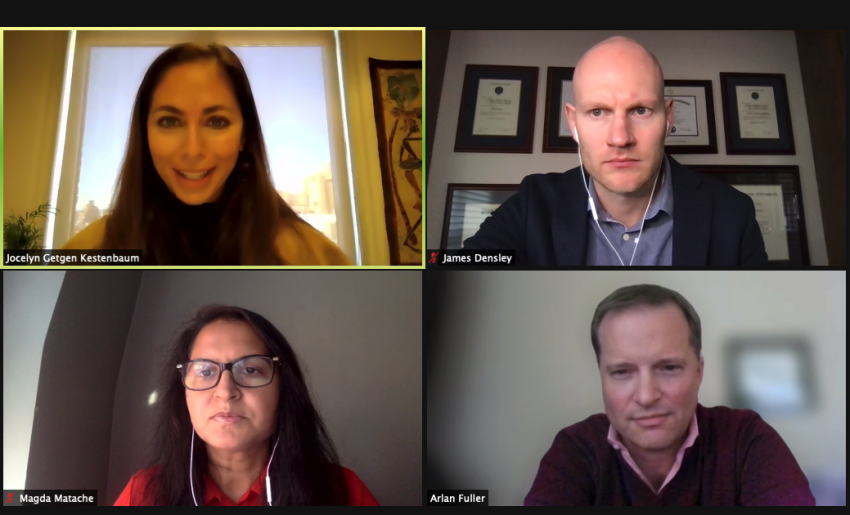
Public Health, Mental Health and Mass Atrocity Prevention, the new book co-edited by Professor Jocelyn Getgen Kestenbaum, examines the role of both public health and mental health policies and practices in the prevention of mass atrocity, including war crimes, crimes against humanity, genocide and the crime of aggression.
To explore these ideas in a more in-depth way and highlight specific examples on a global scale, CLIHHR is hosting a digital dialogue panel series this fall and in the spring of 2022, inviting co-authors of the book to join in discussions about the bigger picture ideas as well as more specific incidents on which they focus their studies. The second panel discussion in the series, held virtually on November 10, welcomed guest speakers James A. Densley, Professor and Department Chair of Criminal Justice at Metropolitan State University and Margareta Matache, a scholar from Romania, director of the FXB Center for Health and Human Rights’ Roma Program, and a Harvard instructor.
Arlan Fuller, lawyer and Chief Operating Officer of Conflict Dynamics International, moderated the discussion. His nonprofit humanitarian organization works to prevent and resolve violent conflict and alleviate human suffering from war and other crises.
Professor Getgen Kestenbaum said, “The goal of this book project, special issue of the Harvard Health and Human Rights Journal, and accompanying digital dialogue series covering these writings is to begin the necessary conversations and collaborations across various disciplines that work in the area of prevention of violence rooted in identity, including genocide and other mass atrocity crimes.”
Fuller said at the start of the panel, “as these particular chapters illustrate, 2021 has been a divisive time and we’re at a breaking point. The pandemic has emerged as one of the greatest global disruptions in U.S. history. It’s magnified the health inequities and the stigmatization of marginalized communities.”
Densley’s chapter in the book focuses on police violence in communities and how it exists as both a cause and a symptom of urban violence. His remarks during the panel focused on the history of structural and behavioral violence against Black individuals and communities in the United States as a continuum of past atrocity crimes, from slavery and the slave trade to Jim Crow persecution. “You can see law enforcement is present at some of the worst atrocities in American history,” he said, “which usually means the police are suppressing the group at the center of it, and they appear to be on the wrong side of history. Rodney King, George Floyd – placing it into historical context is really important in terms of why certain groups don’t trust the police and never have.”
Matache said the ideas for her chapter, which focuses on historical and present-day discrimination, violence and atrocities perpetrated against Roma people through the criminalization of identities and blaming of communities for the spread of disease during pandemic crises, started as a conversation about “our concerns and fears, not as a writing project, about many issues occurring in March and April 2020. We started monitoring hate speech and hate crimes, but we tried to identify patterns of race or cultural prejudice that were being used to legitimate racist policy measures. Scapegoating in pandemics is typically not random – it builds on a history of injustice. Anti-Roma racism has been there for centuries since the arrival of Roma in Europe, but during COVID we have witnessed the increase of violence through anti-Roma policies.”
“Our hope,” said Professor Getgen Kestenbaum, “is to elevate these discussions to scholars, practitioners and policymakers in the emerging field of atrocity prevention to help build next practices for effective atrocity prevention and response to laws that perpetuate identity-based discrimination and violence."
